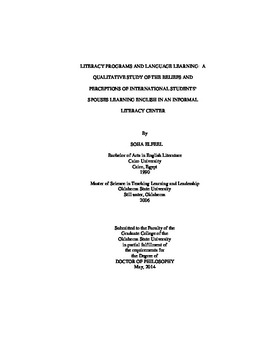| dc.contributor.advisor | Bailey, Lucy E. | |
| dc.contributor.author | Elfeel, Soha | |
| dc.date.accessioned | 2015-06-17T20:05:44Z | |
| dc.date.available | 2015-06-17T20:05:44Z | |
| dc.date.issued | 2014-05 | |
| dc.identifier.uri | https://hdl.handle.net/11244/14821 | |
| dc.description.abstract | This qualitative research study explores the beliefs and perceptions of the spouses of adult international students regarding the ESL literacy programs offered at a unique University Center (UC) for international students and their families. It was intended to provide an understanding of the adult spousal sojourners' beliefs and perceptions of the literacy programs within the context of their cultural backgrounds. The goal was to understand how people of various cultural backgrounds perceived the UC's teaching methods, models, and learning environment. The study was based on interviews and participant observations with spouses of international students from diverse cultural backgrounds who accompanied their husbands or wives to the United States of America for secondary purposes. Data were analyzed using inductive thematic analysis and concepts from symbolic interactionism (Blumer, 1969), critical theory, affective, and sociocultural theories of language learning. Findings included perceptions of the learning environment as the study intended, including that diverse cultural models influenced participants' learning experiences at the UC, and the welcoming environment and its activities facilitated cross-cultural communication and language learning. In addition, some findings were relevant to the students' secondary positionality as sojourners accompanying their spouses to the United States of America. Language learning and secondary positionality symbolized multiple meanings in the participants' respective experiences. Students often felt a sense of "nothingness" in the host society in giving up their professional careers to accompany their spouses and encountered both struggles with and empowerment from language learning in pursuit of their new personal and professional goals. A notable finding was the symbolic role of grammar in the language program to connote language mastery and good teaching beyond its power as a tool of language learning. Language learning, in turn, symbolized access, social adjustment, bonding, liberation, and empowerment. The study concluded with emphasizing the primacy of language learning for the students' adjustment and socialization in the host society. The implications are that language learning is a crucial "lifeline" and tool of survival; thus the students' beliefs and perceptions of learning should be duly considered while designing literacy programs and interpreted in relation to their culture and the learning environment. | |
| dc.format | application/pdf | |
| dc.language | en_US | |
| dc.rights | Copyright is held by the author who has granted the Oklahoma State University Library the non-exclusive right to share this material in its institutional repository. Contact Digital Library Services at lib-dls@okstate.edu or 405-744-9161 for the permission policy on the use, reproduction or distribution of this material. | |
| dc.title | Literacy programs and language learning: A qualitative study of the beliefs and perceptions of international students' spouses learning english in an informal literacy center | |
| dc.contributor.committeeMember | Brown, Pamela U. | |
| dc.contributor.committeeMember | Sanders, Jennifer | |
| dc.contributor.committeeMember | Damron, Rebecca L. | |
| osu.filename | Elfeel_okstate_0664D_13374.pdf | |
| osu.accesstype | Open Access | |
| dc.type.genre | Dissertation | |
| dc.type.material | Text | |
| dc.subject.keywords | culture | |
| dc.subject.keywords | language learning | |
| dc.subject.keywords | literacy | |
| dc.subject.keywords | sojourners | |
| thesis.degree.discipline | Professional Education Studies | |
| thesis.degree.grantor | Oklahoma State University | |
